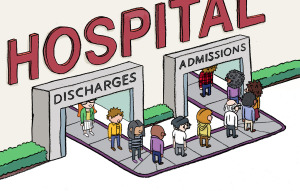
Drugmakers warn new law will deter discoveries
David Ricks, CEO of Indianapolis-based drugmaker Eli Lilly and Co., is turning up the volume on his concerns over a new law that would allow Medicare, for the first time, to negotiate drug prices.

David Ricks, CEO of Indianapolis-based drugmaker Eli Lilly and Co., is turning up the volume on his concerns over a new law that would allow Medicare, for the first time, to negotiate drug prices.

The proposed hike would likely increase tax revenues by more than $117 billion over 10 years, according to estimates by the Tax Policy Center.
A slew of health care bills moving through the legislature target high prices for Hoosiers by encouraging competition and restructuring how the state pays for services under Medicaid.
Federal watchdogs have been sounding the alarm for years about questionable charges on the private version of the Medicare program, with investigators raising the possibility that insurance companies may be bilking taxpayers of billions of dollars every year.
The fast-growing, family-owned operation, based in Miami, has filed plans with the state to renovate three buildings and open them as primary care medical clinics.
The number is down from 62 hospitals last year and 66 the before, but will still cost many hospitals money while they are still dealing with the strain of the pandemic that has overwhelmed resources and reduced their revenue and profits.
Health care can be expensive, so picking the right insurance plan that meets your individual or family needs can be critical to maintaining a balanced budget.
Under the latest proposal, people earning more than $400,000 a year and couples making more than $500,000 would have to pay a 3.8% tax on their earnings from tax-advantaged businesses called pass throughs.
A new study released Thursday by the Rand Corp. showed that Hoosiers covered by employer health plans paid Indiana hospitals nearly three times—or 292%—of what Medicare would have paid for the same procedures.
Prevounce Health, which launched in 2019 in Los Angeles, relocated its operations to Indianapolis last fall and just landed $4.5 million in investment funding which the company says will help it expand and double its workforce in coming months.
The push by Eli Lilly and Co. will come despite an unfavorable ruling last week from Medicare that sharply restricts reimbursements for a drug in the same class.
Thursday’s coverage decision illustrates the impact that a single medication can have on the budgets of individuals and taxpayers.
Starting in early spring, up to eight free tests will be available each month to people who have Medicare’s “Part B” outpatient benefit, which about 9 in 10 enrollees sign up for.
Medicare officials stressed Tuesday that they did not take cost into account in the coverage decision, but rather whether Aduhelm is “reasonable and necessary” for treating Alzheimer’s patients enrolled in the program.
U.S. health secretary Xavier Becerra on Monday ordered Medicare to reassess a big premium increase facing millions of seniors this year, attributed in large part to a pricey new Alzheimer’s drug with questionable benefits.
The biggest policy change—a system for Medicare to negotiate prices for prescription drugs—won’t begin to deliver lower costs until 2025, and then only for a selected set of 10 medicines, as well as insulin products.

For the 10th straight year, the Centers for Medicare & Medicaid Services is using the pressure of lower reimbursements to get hospitals to improve their numbers and cut down on the revolving door of readmissions.
The compromise would allow Medicare to negotiate some prescription drug prices but significantly scale back Democrats’ earlier ambitions.

In Indiana last year, dozens of insurers across the state rolled out plans hoping to get a sizable piece of the fast-growing market.
The so-called “means test” is drawing internal opposition from many Democratic lawmakers, as well as advocacy groups for older people, like AARP.